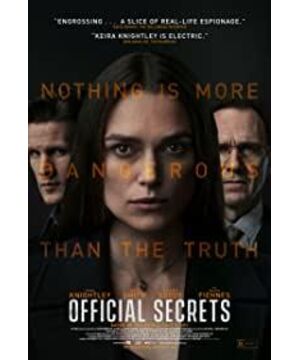This article is divided into two parts . The first part is all taken from the English version of Wikipedia (it does not seem to have a Chinese version of the web page), and has been translated into Chinese. If there are translation errors, please correct me. The second part is taken from the news reported in The Guardian's movie (English version, some important parts will be translated). At the end of the article, I will share some links to news reports about Katharine Gun. BTW, a link to the article webpage will be provided at the end of the article.
Katharine Gun
early life
Gun was born in Taiwan and her parents were British. Because of this, she described herself as a "third culture kid" (meaning that a person grew up in an environment different from that of her parents or in a different country, and was influenced by a different culture. ). As a child, she attended Morrison Academic School in Taiwan. Only study Japanese and Chinese at Durham University in the UK. After graduation, she worked with the British intelligence agency-Government Communications Headquarters (GCHQ). And said in the later working years:
I didn't have much idea about what they did...I was going into it prettey much blind. Most people do.
Leaks
Gun's daily work at GCHQ is translation work between English and Chinese. On January 31, 2003, Gun read an email from Frank Koza ( the intelligence officer who the reporters of the Observer in the movie wanted to verify at first, but in the encyclopedia, this person is not There are related information links ), Koza is the head of the'regional targets' n department of the situation agency of the United States. And the content of the email involved a secret and illegal operatio to manipulate the UN's voting for six countries. These six countries are Angola, Bulgaria, Cameroon, Chile, Guinea, and Pakistan, which are called "Swing nations" (should be countries that have a swing attitude towards voting), and the proposal for this vote is whether the UN allows the launch of an armed attack on Iraq.
Gun was irritated by the content of the email, printed the content of the email and then took it home. After thinking about the email, Gun sent the content of the email to a friend who had a relationship with the reporter. In February of the same year, she participated in an anti-war demonstration in London. It was not until Sunday, March 2 that Gun saw the relevant report in the email on the front page of the Observer newspaper. Less than a week later, on March 5, Gun admitted to her department head that she had leaked the secrets and was arrested at the same time. In the BBC interview with Jeremy Paxman, she admitted that she had never communicated with a lawyer because she thought it would not be of much substantial help-"honesty didn't think that would have had any practical effect". Gun was detained one night. Eight months later, she was charged with leaking official state secrets. (Interestingly) while she was waiting for a hearing on whether she would be charged, she studied for a master's degree in International Code of Ethics at Birmingham University.
Trial
On October 13, 2003, Gun was accused of violating the 1989 Official Secrets Act (actually the title of the film-Official Secrets Act 1989). Her case immediately attracted great attention among anti-war activists, and many people asked the British government to drop the charges. In a later court, Gun stated that she pleaded not guilty to the charges because she believed the war to invade Iraq was illegal.
On February 24, 2004, during a one-and-a-half hour court defense, the prosecution withdrew the prosecution because it was unable to provide evidence (of the confidential documents that Gun leaked). The specific reason for the prosecution's cancellation of the prosecution is unclear. The opinion of the media believes that the government has given up the prosecution because of the pressure of public opinion, and the government spokesperson stated that the government had already decided to abandon the prosecution before the defense department filed a request for the prosecution. At the court hearing that day, Gun stated:
I'm just baffled in the 21st century we as human beings are still dropping bombs on each other as a means to resolve issues.
In a Guardian report in 2019, it was pointed out that even the prosecutors believed that the evidence prosecuting Gun would reveal that the act of invading Iraq by force was illegal. Leaking or briefing? Inside the world of ministers' secrets
Life after
Gun won the Sam Adams Awards in 2003, and two years later (probably in 2005) wrote an article-"Iran: Time to Leak", requesting more potential leakers to provide the public whether the government is right Iran prepares to launch an armed attack. And said:
those in position to do so to disclose information which relates to this planned agression; legal advice, meetings between the White House and other intellience agencies, assessments of Iran's threat level (or better yet, evidence that assessments have been altered), troop deployments and army notifications. Don't let'the intelligence and the facts be fixed around the policy' this time.
(The general idea is to request disclosure and disclosure of consultations on the invasion plan and legality (some Western governments need to obtain a vote of Congress on the one hand before officially declaring war on other countries, and on the other hand, they also need to consult legal counsel on the legal basis of the declaration of war. , Otherwise there will be the possibility of unconstitutionality), meetings between the White House and the intelligence agencies, the Iranian government’s security is the first level of assessment, military deployment. Don’t let the intelligence agencies and facts interfere again and wrongly influence the (national) policy, in short That is, one-sided facts must not be allowed to influence the formulation of national policies and thus public opinion).
In 2019, a movie called'Official Secrets' was released, showing Gun's feat in 2003, and Keira Knightley played Gun.
Katharine Gun
Third culture kid
The Observer
Official Secrets (film)
In the second part, in 2003, the Guardian reported that the invasion of Iraq was illegal.
(By the way: The news in the upper right corner of this newspaper Lost in Spacey: the Oscar winner tells all to Mariella Frostrup—— 'Anybody worth their salt feels like a fake most of the time' , it is about Kevin Spacey, and Spacey is in In the same year starred in the movie The Life of David Gale )
Revealed: US dirty tricks to win vote on Iraq war
The United States is conducting a secret'dirty tricks' campaign against UN Security Council delegations in New York as part of its battle to win votes in favour of war against Iraq.
Details of the aggressive surveillance operation, which involves interception of the home and office telephones and the emails of UN delegates in New York, are revealed in a document leaked to The Observer. Eavesdropping of phone calls and emails.)
The disclosures were made in a memorandum written by a top official at the National Security Agency-the US body which intercepts communications around the world-and circulated to both senior agents in his organisation and to a friendly foreign intelligence agency asking for its input.
The memo describes orders to staff at the agency, whose work is clouded in secrecy, to step up its surveillance operations'particularly directed at... UN Security Council Members (minus US and GBR, of course)' to provide up-to- the-minute intelligence for Bush officials on the voting intentions of UN members regarding the issue of Iraq.
The leaked memorandum makes clear that the target of the heightened surveillance efforts are the delegations from Angola, Cameroon, Chile, Mexico, Guinea and Pakistan at the UN headquarters in New York-the so-called'Middle Six' delegations whose votes are being fought over by the pro-war party, led by the US and Britain, and the party arguing for more time for UN inspections, led by France, China and Russia. The United States and the United Kingdom lead, while the opposition is led by France, China and Russia.)
The memo is directed at senior NSA officials and advises them that the agency is'mounting a surge' aimed at gleaning information not only on how delegations on the Security Council will vote on any second resolution on Iraq, but also'policies','negotiating positions','alliances' and'dependencies'-the'whole gamut of information that could give US policymakers an edge in obtaining results favourable to US goals or to head off surprises'.
Dated 31 January 2003, the memo was circulated four days after the UN's chief weapons inspector Hans Blix produced his interim report on Iraqi compliance with UN resolution 1441.
It was sent by Frank Koza, chief of staff in the'Regional Targets' section of the NSA, which spies on countries that are viewed as strategically important for United States interests. (This memo issued by Frank Koza)
Koza specifies that the information will be used for the US's'QRC'-Quick Response Capability-'against' the key delegations.
Suggesting the levels of surveillance of both the office and home phones of UN delegation members, Koza also asks regional managers to make sure that their staff also'pay attention to existing non-UN Security Council Member UN-related and domestic comms [office and home telephones] for anything useful related to Security Council deliberations'. (Eavesdropping on the offices and residences of the United Nations delegation, and on United Nations affairs related to United Nations affairs and not participating in the (United Nations) Security Council Member States’ representatives and domestic communications Eavesdropping)
Koza also addresses himself to the foreign agency, saying:'We'd appreciate your support in getting the word to your analysts who might have similar more indirect access to valuable information from accesses in your product lines [ie, intelligence sources].' Koza makes clear it is an informal request at this juncture, but adds:'I suspect that you'll be hearing more along these lines in formal channels.'
Disclosure of the US operation comes in the week that Blix will make what many expect to be his final report to the Security Council.
It also comes amid increasingly threatening noises from the US towards undecided countries on the Security Council who have been warned of the unpleasant economic consequences of standing up to the US.
Sources in Washington familiar with the operation said last week that there had been a division among Bush administration officials over whether to pursue such a high-intensity surveillance campaign with some warning of the serious consequences of discovery.
The existence of the surveillance operation, understood to have been requested by President Bush's National Security Adviser, Condoleezza Rice, is deeply embarrassing to the Americans in the middle of their efforts to win over the undecided delegations.
The language and content of the memo were judged to be authentic by three former intelligence operatives shown it by The Observer. We were also able to establish that Frank Koza does work for the NSA and could confirm his senior post in the Regional Targets section of the organisation.
The NSA main switchboard put The Observer through to extension 6727 at the agency which was answered by an assistant, who confirmed it was Koza's office. However, when The Observer asked to talk to Koza about the surveillance of diplomatic missions at the United Nations, it was then told'You have reached the wrong number'. (NSA transferred the phone number from the Observer to Koza's office and stated that 6727 was Koza's office, but when the reporter asked about the UN's diplomatic mission (wiretapping) During the investigation, I was told that the phone number was wrong)
On protesting that the assistant had just said this was Koza's extension, the assistant repeated that it was an erroneous extension, and hung up.
While many diplomats at the UN assume they are being bugged, the memo reveals for the first time the scope and scale of US communications intercepts targeted against the New York-based missions.
The disclosure comes at a time when diplomats from the countries have been complaining about the outright'hostility' of US tactics in recent days to persuade then to fall in line, including threats to economic and aid packages.
The operation appears to have been spotted by rival organisations in Europe.'The Americans are being very purposeful about this,' said a source at a European intelligence agency when asked about the US surveillance efforts.
Also share a few articles
2003
US plan to bug Security Council: the text
2019
Iraq war whistleblower Katharine Gun:'Truth always matters'
Katharine Gun: Ten years on what happened to the woman who revealed dirty tricks on the UN Iraq war vote?
View more about Official Secrets reviews











